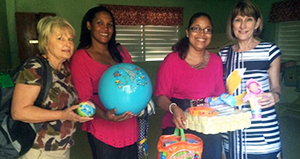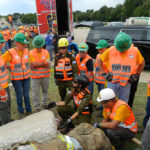KENEDY—What can a retired teacher contribute to teacher training in another culture where she doesn’t speak the language? And what if the teachers are overwhelmed by crowded classrooms with up to 60 children, without books and adequate teaching aids?
Debbie Witte from First Baptist Church in Kenedy faced those and other questions as she began 10 days of teacher training at three schools in the Dominican Republic, serving with South Texas Children’s Home Ministries’ international program.
‘White noise’
Bouncing down deeply rutted dirt roads, Witte discovered a new meaning for the term “white noise”—a cacophony of merengue music at ear-splitting volume, horns honking and vendors squawking, and zealots with microphones proclaiming their spin on society’s ills and cures.
In the classroom, the white noise combined with children’s voices as they one-upped each other in volume. Windows stayed open and walls stopped short of the ceiling to offer essential ventilation in the tropical climate, but they also allowed sounds to echo and pass from classroom to classrooms
Training teachers
 Gwen Havner (left) and Debbie Witte (right) devoted 10 days to train teachers at three schools in the Dominican Republic.Witte had traveled to the Dominican Republic several times and participated in short seminars for teachers. On the most recent trip, she worked alongside another retired teacher, Gwen Havner, spending one day observing in each school. On the weekend, they consulted with Rebeca Dinzey, director of the Samuel’s Fund, a child-sponsorship program of South Texas Children’s Home Ministries, and on-site education expert. Then Witte and Havner returned to each school to train the teachers.
Gwen Havner (left) and Debbie Witte (right) devoted 10 days to train teachers at three schools in the Dominican Republic.Witte had traveled to the Dominican Republic several times and participated in short seminars for teachers. On the most recent trip, she worked alongside another retired teacher, Gwen Havner, spending one day observing in each school. On the weekend, they consulted with Rebeca Dinzey, director of the Samuel’s Fund, a child-sponsorship program of South Texas Children’s Home Ministries, and on-site education expert. Then Witte and Havner returned to each school to train the teachers.
“We were able to give practical ideas and tools that they can use to connect individually with students in spite of the crowded conditions. We gave suggestions to help integrate facts with comprehension and practical applications,” Witte said.
For instance, they recommended rearranging students so children who presented discipline problems were seated at the front, rather than at the back; encouraging teachers to walk among the students, rather than stand at the front; and using a touch or pat on the shoulder or a finger on the passage being read.
Sign up for our weekly edition and get all our headlines in your inbox on Thursdays
Dealing with over-crowded classrooms
Keeping students engaged can be difficult in those over-crowded situations, she acknowledged. Witte and Havner handed students inexpensive plastic spoons with a red dot on one side and a green dot on the other. When the teacher asked questions, the students responded “yes” with green and “no” with red.
They also taught similar techniques, allowing students to respond with thumbs-up or thumbs-down gestures or by either sitting or standing.
Witte and Havner observed reading as the students’ greatest challenge and deficiency, since they lack reading materials in schools and homes. Pairing students, they taught them techniques such as echo-read, choral-read and partner-read.
Used by God
At the end of their time, one principal voiced the feelings of many: “God provided through you exactly what we needed.”
The two veteran educators likewise felt God at work in their lives.
“This was exactly what I needed to draw me closer to God. It has changed my life,” Havner said.
“God called me to do this,” Witte said. “God has a plan for everyone, and we don’t listen sometimes. We need to just listen, and then do.”
















We seek to connect God’s story and God’s people around the world. To learn more about God’s story, click here.
Send comments and feedback to Eric Black, our editor. For comments to be published, please specify “letter to the editor.” Maximum length for publication is 300 words.